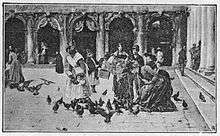Alessandro Zezzos
Alessandro Zezzos (1848 in Venice – 1914 in Vittorio Veneto)[1][2] was an Italian painter of genre scenes, costume scenes, portraits, and vedute, in watercolors and oils.

He studied under Giacomo Favretto, Alessandro Milesi, and Luigi Nono at the Academy of Fine Arts in his native Venice.[3] In 1873, he exhibited in Venice: Né sposo né figlio and Scena famigliare. In 1877 at Paris, Les saltimbanques and Les pingeons de Saint Marc.[4] He was active as a painter in Venice. Among his watercolors are Le rondini, exhibited at 1880 at Turin; Una calle, exhibited at the 1891 Mostra Triennale of the Brera Academy. In 1881 at Milan, displayed the paintings: Mercante di ventagli; At the Predica, Half-figure of a Girl; and Popolana. In 1883 in Rome, exhibited: The Lovers. He painted Love Letter, Una fuga nel 1700; and The Dockside of San Marco.[5] He sent to Paris in 1877-1878, the paintings: Pigeons of St Mark, El-Mazrama (Mouchoir of the Sultan), Los Saltimbanques, and A venetian - A Daughter of the People.[6]
He had a retrospective exhibit at the Castello Sforzesco of Milan in 1937. Umberto Boccioni was one of his pupils. Among his colleagues and fellow pupils of Favretto were Bartolomeo Bezzi, Guglielmo Ciardi, Antonio Dal Zotto, Pietro Fragiacomo, Emilio Marsili, Luigi Nono, Augusto Sezanne, and Ettore Tito.
Notes
- 1 Painting(s) by or after Alessandro Zezzos at the Art UK site: Outside St Mark's.
References
- ↑ Dates, A Checklist of Painters, C1200-1994.
- ↑ Enciclopedia Treccani Short biography.
- ↑ Modern Italy 1738-1898. 2nd edition, Count Pietro Orsi; Publisher T Fisher Unwin, Paternoster Square, E.C. London.1899 page 378.
- ↑ Istituto Matteucci short biography.
- ↑ Dizionario degli Artisti Italiani Viventi: pittori, scultori, e Architetti., by Angelo de Gubernatis. Tipe dei Successori Le Monnier, 1889, page 560.
- ↑ Artists of the Nineteenth Century and Their Works: A Handbook Containing Two thousand and fifty biographical sketches. Fifth edition, By Clara Erskine Clement Waters, Laurence Hutton, Houghton and Mifflin,Bostonand New York, 1889, page 370.